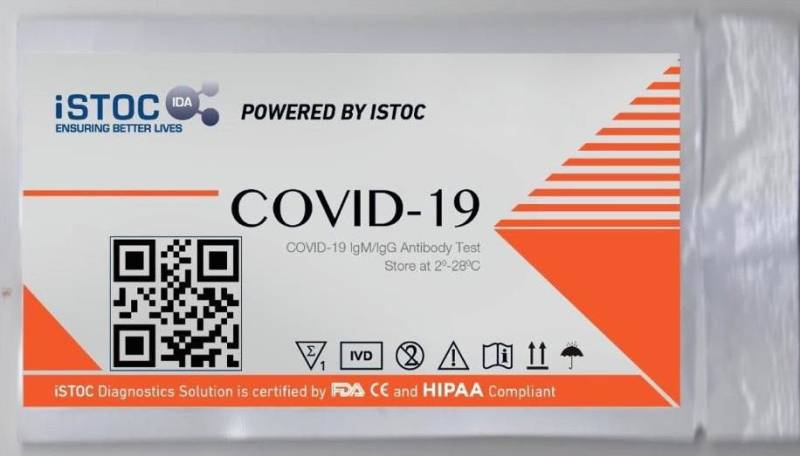Digital, rapid tests to help Pakistan fight coronavirus pandemic
Finger-prick blood test can help determine infection while digitising the process

Stay tuned with 24 News HD Android App

After nearly 40 days and over 4,000 confirmed cases, Pakistan’s focus is now shifting to rapid testing to assess the reach and contain the spread of the coronavirus. To improve the capacity, a new rapid Covid-19 digital test can prove to be a game-changer, health experts say.
A Pakistani medical company, Innovative Healthcare Systems (IHS), has partnered with a company in Finland and procured digital test kits, which would be rolled out after finalising details with the federal and the provincial governments as well as the hospitals.
“The iSTOC IDA mobile diagnostics platform from the Finnish company can detect antibodies and provide a digital analysis. It integrates diagnostics, mobile technology and cloud computing into one platform. It basically turns your smartphone into a virtual lab where the results are displayed, offering faster, easier, and precise diagnostics, enabling quick action and treatment,” Umair Azam, founder and CEO of IHS, told Gulf News. “The biggest advantage is that it creates a digitised diagnostic data with geographical mapping that can help monitor and control outbreaks.”
The tests can help the government achieve two results in one go: enhance rapid testing and enable digital diagnostic data. Pakistan has conducted around 42,000 tests so far as the total number of confirmed cases rise to 4,190 (as of April 8).
How does it work?
The test kit works in the same way blood sugar is tested by using a pinprick on patients’ thumbs. The results can be obtained within minutes. Explaining the process, Dr Zia Azam, director health informatics at IHS, told Gulf News that “the rapid test kits, with 95 percent accuracy, can help save time and reduce direct contact as one counter set up at a village, town or city can test hundreds. Instead of inviting patients to hospitals, we are taking the tests to the masses.”
After the test is conducted, the data (complete with patient information and GPS location) is automatically sent to the IDA (immediate diagnostics and analytics) secure cloud and is available for the health care professionals. The experts then accordingly guide the person on the ground. “If it’s negative, no action is required. If it’s positive, guide them to the treatment services. If there’s some error, we test again,” he said.
The company claims the blood-based-test is more efficient than the polymerase chain reaction (PCR), the nose and throat swab test. “Time is of the essence to protect our people, especially healthcare workers on the frontline, from the infection. We need a smart approach to deal with the challenge,” he added. The cost of the test is significantly low as compared to PCR test.
How the test is done in three steps?
1. Take a test — Nurse or doctor performs the diagnostic test
2. Read the test — Scanned in a mobile phone using IDA application
3. Store result — IDA Secure Cloud checks the result immediately for diagnosis
What do medical experts think of the rapid test?
Pakistani health professionals have welcomed the rapid tests but still, consider PCR tests the “gold standard” for Covid-19 testing. “With the increasing number of patients, Pakistan urgently needs tests that are cheaper, quicker and more accessible. ELISA based test, which detects antibodies in your blood, appear promising and can be a great tool for screening patients, at the point of care, rapidly and cost-effectively. However, the best method would be to follow the rapid test with PCR test,” Dr Muhammad Jabran Nawaz, a general physician, told Gulf News.
There are two types of diagnostic tests for infectious organisms. “PCR test is used to detect current infection and antibody-based tests to diagnose the previous infection,” explained Dr Fouzia Sadiq, Director Research at Shifa Tameer-e-Millat University. “Both tests have their own significance. PCR is the correct first step to detect viral RNA in the blood as compared to the antibody tests that help identify the infection from about a week after the onset of infection.” The antibody testing with its digital analytics and real-time data features can prove to be a critical tool for health experts in the future but “both tests together can get more effective results.”
Can the new test kits prove to be a game-changer?
1. It enables faster, convenient, precise and cost-effective diagnostics combining mobile technology and cloud computing.
2. As compared to PCR tests, the digital test reduces both human error and technology gaps. It saves time and cost as the results are recorded digitally and uploaded to the cloud platform instead of manual reports and a visit to labs.
3. Reduce direct contact and virus exposure, as patients do not need to go to hospitals or clinics.
4. Test results obtained in minutes whereas the PCR tests results may take 24 to 48 hours.
5. It can help generate and divide data by age, gender and locations, publishing visual reports and producing heat maps of infections.
How mobile technology helped Pakistan earlier?
This is not the first time Pakistan’s IHS has collaborated with the Finnish company iSTOC. In 2018, together with the Sindh government, they utilised the mobile diagnostics technology to screen 120,000 people in Sindh for six infectious diseases.
“We conducted mass screening to identify, treat and rehabilitate people affected by infectious diseases such as hepatitis B, hepatitis C, HIV, malaria, dengue and chikungunya, covering more than 70 locations in less than four weeks for free of cost,” explained Dr Zia Azam. The screening helped the government track health care progress and take necessary measures. The same technology can help Pakistan curb coronavirus pandemic too, experts hope.
